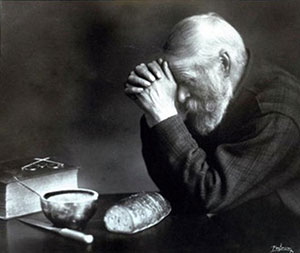 One of the things St. Ignatius of Loyola challenges us to do is to reflect upon some of the prayers that we have prayed since we were children. These prayers often become rote, and we are called to enter more deeply into them and become more aware of the richness of what we are praying.
One of the things St. Ignatius of Loyola challenges us to do is to reflect upon some of the prayers that we have prayed since we were children. These prayers often become rote, and we are called to enter more deeply into them and become more aware of the richness of what we are praying.
When the disciples asked Jesus to teach them to pray, he responds with the Our Father. A few weeks ago, I was struck by the third petition and how it relates to the first.
We pray, “Give us this day our daily bread.” Scholars tell us that a rare Greek word is used for what is translated as our “daily bread.” The word may refer not just to the food that nourishes our bodies but also to the spiritual food that nourishes our spirits. Thus, some of the Fathers of the Church saw it as also referring to the Eucharist.
As the Gospel tells us, Jesus is “the Bread of Life.”
What nourishes, challenges you?
We begin by praying “Our Father.” Of course, we speak by analogy, as God is both Father and Mother to us. Just as a mother nourishes her child, first with her own blood when the child is forming in her womb, and then after birth with her milk, so too God nourishes us with his Body and Blood in Communion and with the milk of his Word.
Just as a mother both cuddles her child and challenges the child to grow up, so too God’s grace both cuddles us and challenges us. Just as a father guides his child, so too God the Father guides us through the Scriptures and through the Church.
Let us reflect on this. Who or what nourishes and challenges you? How do you see God nourishing, challenging, and guiding you? What does the Eucharist/Communion mean to you?
What forgiveness is needed?
 “Grace” a 1918 photograph by Eric Enstrom.“Forgive us our trespasses (sins) as we forgive those who trespass (sin) against us.” (In India and other lands where English is one of the official languages, the archaic English term “trespasses” is replaced by “sin.”) Whenever we forgive those who sin against us, we are helping God’s kingdom to come “on earth as it is in heaven.”
“Grace” a 1918 photograph by Eric Enstrom.“Forgive us our trespasses (sins) as we forgive those who trespass (sin) against us.” (In India and other lands where English is one of the official languages, the archaic English term “trespasses” is replaced by “sin.”) Whenever we forgive those who sin against us, we are helping God’s kingdom to come “on earth as it is in heaven.”
How have you experienced God’s forgiveness? Being forgiven yourself, does it help you to forgive others? Note how we always begin Mass by acknowledging our sins and recognizing God’s mercy to us. When there is true forgiveness, we fulfill Jesus’ words that “the Kingdom of God is among you.” Reflect on the gift of forgiveness in your life. What forgiveness is needed in our world?
Deliver others from evil?
“Lead us not into temptation but deliver us from evil.” Of course, God does not lead us into temptation, and some translations from the Greek depict this. The question is: Do I ever lead others into temptation through my words or actions? Do I help deliver others from the evils of discrimination, poverty, loneliness or ignorance? When I do so, am I not doing God’s will “on earth as it is in heaven”?
Is it any wonder that this is the prayer that Jesus teaches us?
Jesuit Father John Michalowski is the parochial vicar at St. Peter Parish in Charlotte.


